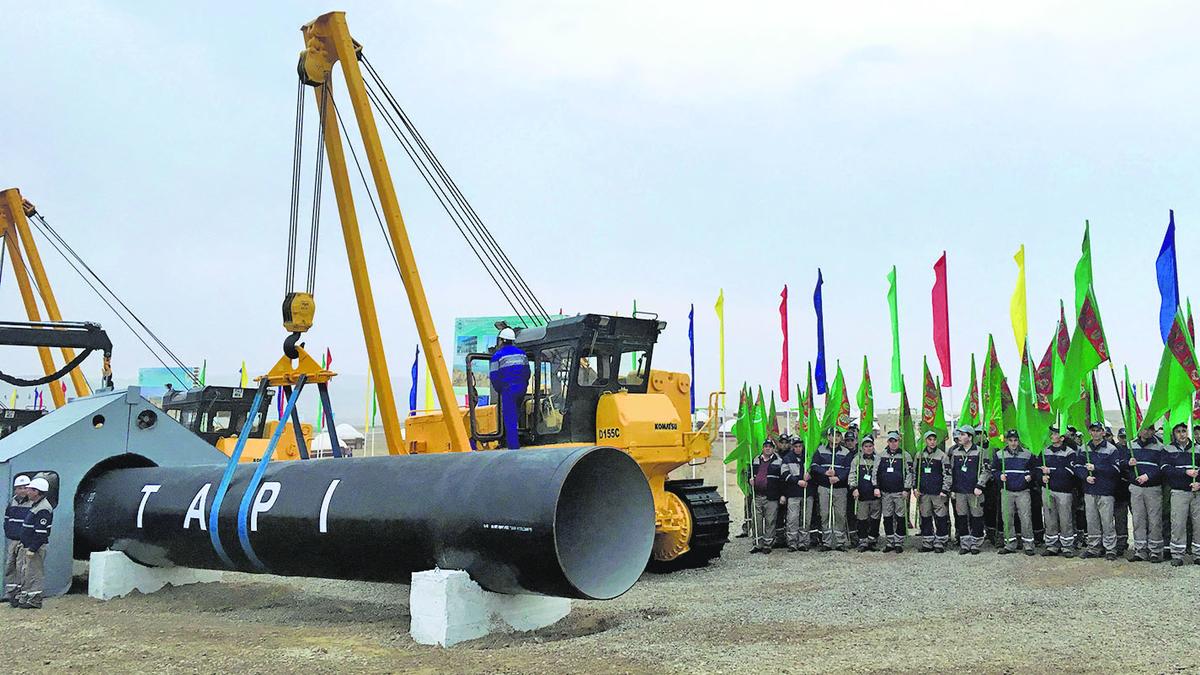Progress on the TAPI pipeline has been repeatedly delayed due to security concerns in conflict-ridden Afghanistan. File | Photo credit: Reuters
Afghanistan said on Wednesday (September 11, 2024) that work would begin on a $10 billion gas pipeline crossing South Asia, as officials joined dignitaries in neighboring Turkmenistan to celebrate its completion on that side of the border.
Progress on the TAPI pipeline – which runs through Turkmenistan, Afghanistan, Pakistan and India – has been repeatedly delayed due to security concerns in conflict-ridden Afghanistan.
“From today, operations will begin on Afghan territory,” Taliban government spokesman Zabihullah Mujahid said at the ceremony in comments broadcast by Afghan state television.
Also read: TAPI gas pipeline project breaks ground on Turkmenistan’s border with Afghanistan
At the border ceremony in Islam Cheshma in Turkmenistan, officials on both sides, including Afghan Prime Minister Hassan Akhund, hailed the project.
“This project will benefit not only the economies of the participating countries, but also the countries of the entire region,” Turkmen President Serdar Berdimuhamedow said in a video broadcast live during the ceremony.
In the Afghan border province of Herat, a holiday was declared to mark the occasion, during which posters in honor of the project were pasted around the capital of the same name.
The pipeline will extract approximately 33 billion cubic meters of natural gas annually from the Galkynysh gas field in southeastern Turkmenistan.
It will be pumped by a 1,800 km (1,120 mile) pipeline through Afghanistan, including Herat and Kandahar in the south, before entering Pakistan’s restive Balochistan province and ending in Fazilka in Punjab.
Pakistan and India will each take 42% of gas supplies, and Afghanistan 16%, while Kabul will also benefit from lucrative transit costs of around $500 million a year, according to Afghan media.
Work on the Turkmen side began in 2015 and was initially scheduled to start in Afghanistan in 2018, but has been repeatedly postponed.
India’s involvement in the pipeline has also previously been questioned due to its relationship with Pakistan and its already easy access to liquefied natural gas markets.
Jobs and cheap gas
The ceremony was an opportunity to simultaneously launch several bilateral projects, including a fiber optic line to Herat, an electricity line and the inauguration of a railway bridge.
In a country plagued by unemployment, TAPI “will employ 12,000 people in Afghanistan,” government spokesman Mujahid said. AFP.
Neither Afghan nor Turkmen officials provided details on funding or the expected date when TAPI will come online.
However, Swapnil Babele, analyst at research group Rystad Energy, expects further delays “as much work remains to be done and the issue of future financing is unclear”.
“We expect it will only be operational within the next decade,” he added.
For the three recipient countries, the pipeline will have the advantage of “delivering gas cheaper than liquefied natural gas and ensuring a consistent supply.”
It is the most important development project for the Taliban authorities since they seized power in 2021, ending their two-decade insurgency against the foreign-backed government.
The pipeline gives the government, which is not officially recognized by any country, a strategic role in regional cooperation between Central Asia and South Asia, which faces massive energy shortages.
Although Afghanistan remains under economic and financial sanctions from the West, it is currently trying to revive ambitious projects, especially in the fields of energy, mines and infrastructure.
In late July, Afghanistan and China officially launched a major copper mining project in the world’s second-largest known deposit near Kabul, which has been stuck since 2008.
Published – Sep 12, 2024 09:27 AM IST





















